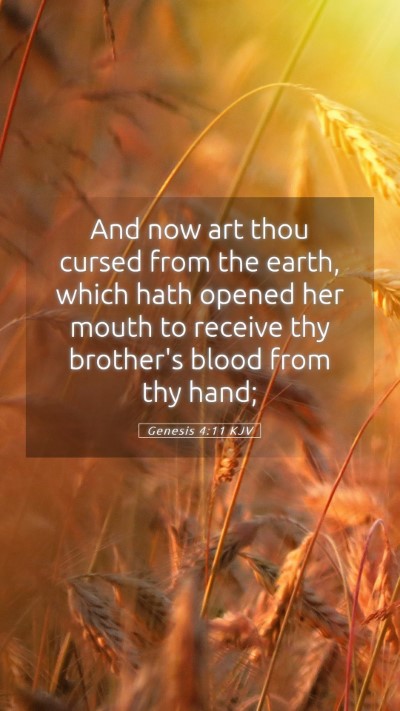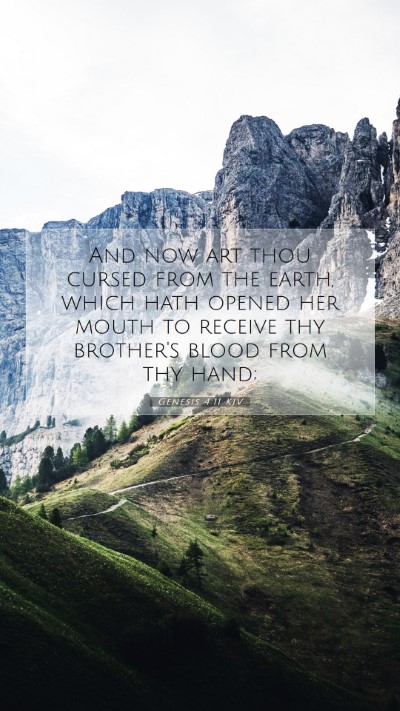Understanding Genesis 4:11
Genesis 4:11 states, "And now art thou cursed from the earth, which hath opened her mouth to receive thy brother's blood from thy hand." This verse follows the narrative of Cain after he has murdered Abel, and it conveys profound themes of judgment, consequence, and divine justice. Below, we explore the meaning of this verse using insights from public domain commentaries.
Bible Verse Meaning and Interpretations
The interpretation of this verse provides a rich tapestry of insights:
-
Divine Judgment:
According to Matthew Henry, this verse represents God's judgment not only on Cain's act of murder but also on Cain himself. The curse signifies that Cain will experience alienation not only from God but also from the earth that he tilled.
-
Consequence of Sin:
Albert Barnes emphasizes that this curse embodies the consequences of sin. Cain's actions opened the way for divine retribution, illustrating a critical theme in Scripture: one’s sin leads to separation from God and suffering in various forms.
-
Symbolic Meaning of Blood:
Adam Clarke remarks on the symbolic significance of blood in the Old Testament. The earth is portrayed as complicit in Abel’s murder, having received his blood – a metaphor for innocence lost and the horror of sin spilling into the created order. This interpretation highlights the gravity of violence and injustice.
-
Isolation and Wanderer:
The curse not only affects the earth but also compels Cain to roam as a fugitive and a vagabond, as further elucidated by Henry. This notion of wandering emphasizes a loss of belonging and community, marking Cain as an outsider forever affected by his heinous action.
Contextual Analysis
To fully understand the ramifications of Genesis 4:11, it is critical to look at its context:
-
Historical Context:
This account occurs shortly after the creation narrative, highlighting humanity's quick onset of sin (the Fall) and its immediate consequences. Cain's murder of Abel can be seen as one of the first fruits of human sin and disobedience against God.
-
Thematic Elements:
Central to this verse is the theme of justice. The former harmony of creation becomes disrupted by Cain’s sin, marking a significant turning point in the human narrative as it transitions from innocence to condemnation.
Applications of Genesis 4:11
When interpreting this verse, we can draw relevant applications for our lives today:
-
Understanding Consequences:
This passage serves as a reminder that sin has real consequences. Just as Cain faced the repercussions of his actions, we too must be aware of the extended impact of our decisions in our lives and in the lives of others.
-
Reflecting on Regret:
Cain’s story invites us to reflect on our own shortcomings and the times we have harmed others. Recognizing the weight of sin can cultivate a spirit of repentance and the drive to seek forgiveness from God and others.
-
Social Implications:
This verse also challenges us to consider the social implications of our actions. How often do we turn a blind eye to injustice? Understanding Genesis 4:11 compels us to advocate for those who have been wronged.
Cross References
Genesis 4:11 can be related to several cross-referenced passages:
- Genesis 9:6: Discussing the sanctity of human life and the consequences of shedding blood.
- Hebrews 11:4: Highlighting Abel’s righteous actions in contrast to Cain’s wrongdoing.
- 1 John 3:12: Referencing Cain's evil actions and their implications for understanding sin and righteousness.
Conclusion
In summary, Genesis 4:11 serves as a profound biblical passage illustrating the weight of sin, the essence of divine justice, and the consequences that follow. By engaging with this scripture through thoughtful analysis and reflection, believers can deepen their understanding of biblical justice and the necessity of atonement.
Using resources such as commentaries, online Bible study guides, and engaging in Bible study groups can enhance our comprehension of such difficult passages, providing valuable insights and promoting a more comprehensive understanding of Scripture.


